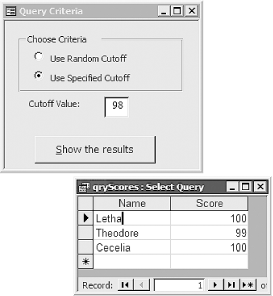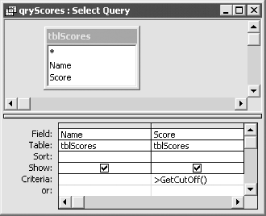| [ Team LiB ] |
|
Recipe 1.7 Use a VBA Variable to Filter a Query1.7.1 ProblemYou'd like to be able to return rows in a query that have a test score greater than a specified value, which is stored in a VBA variable. When you try to use the variable in the query design grid, Access thinks it's a literal value. Is there some way to get queries to understand VBA variables? 1.7.2 SolutionTo use a VBA variable in a query, you need to write a VBA function that returns the value of the variable as its return value and then reference the VBA function either as part of a calculation or in the criteria of a field. The only way to work with VBA in queries is to call a function. This solution shows you how to do that. In the sample database 01-07.MDB you'll find tblScores, a table of names and test scores. The goal of the sample is to allow you to specify a cutoff value and list everyone whose scores are greater than that value. Open the frmScores form. This form allows you to choose between a randomly selected cutoff value and a user-specified cutoff value. If you choose the user-specified cutoff value, a text box is made visible to allow you to enter the cutoff value. When you click on the "Show the results" command button, an event procedure runs that saves the cutoff value—either the randomly chosen cutoff or the user-specified cutoff—to a private variable and then runs the qryScores query. The qryScores query references the private variable using the GetCutoff function and then returns the rows in tblScores in which the score is greater than the cutoff value (see Figure 1-19). Figure 1-19. The sample form, frmScores, and its output, qryScores Follow these steps to use a VBA variable in a query:
Figure 1-20. The sample query, qryScores, in design view
1.7.3 DiscussionA query cannot directly reference a VBA variable. It can, however, call a VBA function that returns the value stored in the VBA variable. To do this, you write a VBA wrapper function for each variable you wish to pass to a query. Because functions on form and report modules are normally local to that form or report (although you can make these functions public), you'll usually want to call a function stored in a global module—a module you can see in the database container. In the example, we used a form to collect the values to pass to the VBA variable, intCutoff. Another way to solve this problem would be to use a parameter query that directly references the text box on frmScores. The example form frmScoresTextbox combined with qryScoresTextbox show this approach in action. Using a form to feed the values to a query will not, however, always be so convenient. There will be times where you need to use a variable without a form. For example, you might use global variables to store settings that are read from an options table upon application startup. This options table might store, for example, the complete name of the user, her address, and other preferences. You may decide to store these values in a set of global variables to minimize the number of times you have to reread the values from the options table. In this case, these variables will not be stored on any form. As another example, you may need to base the query on some value obtained from another application using Automation. Even in those cases, however, you can always use a hidden form if you prefer that approach.
1.7.4 See AlsoFor more information on declaring variables and creating modules, see How Do I Create a New Module? in the Preface. |
| [ Team LiB ] |
|